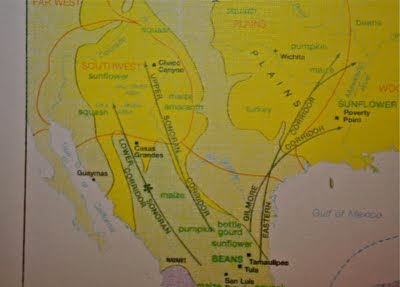Nahuacalli Educators
Alliance
In Imiuh Tenamaztle
In Imiuh Tenamaztle
In ompa Tlamananalco inic oniquizaco inic onihuallihualoc ca mitl,
onimacoc in Inimiuh Tenamaztle, auh yehhuatl ihihyo ixpantzinco, tehhuan
tamechnahuatih totlahtol.
March 12, 2012

The State of Arizona
Superintendent John Huppenthal
Office of
Superintendent of Public Instruction
1535 W. Jefferson Street
Phoenix, AZ 85007
1535 W. Jefferson Street
Phoenix, AZ 85007
Dear Mr.
Huppenthal,
The
11th Session of the United Nations Permanent Forum on Indigenous Issues will convene at UN
Headquarters in New York from May 7 -18, 2012. A special theme for discussion at this year’s session will
be the “Impact of the Doctrine of
Discovery on Indigenous Peoples”, which is the subject of the Preliminary Study on the Impact of the Doctrine of Discovery submitted to the UNPFII at the
9th Session in 2010.
The intent of this letter is to solicit a response from the Arizona
Department of Education addressing the impact of the Doctrine of Discovery in
terms of past and present educational policies and practices in the State of
Arizona.
Context
On
September 13, 2007 the UN General Assembly adopted the UN Declaration on the Rights of Indigenous Peoples. As a standard setting instrument of
International Law, the UN Declaration on the Rights of Indigenous Peoples (UNDRIP) establishes for the first time
in five hundred years that Indigenous Peoples are “Equal to all other
peoples….” with corresponding rights as “PEOPLES” in the world community. Of the 46 Articles proclaimed in the
UNDRIP, the following are particularly pertinent to our present request:
Article 3
Indigenous peoples have the right to
self-determination. By virtue of that right they freely determine their
political status and freely pursue their economic, social and cultural
development.
Article 5
Indigenous peoples have the right to
maintain and strengthen their distinct political, legal, economic, social and
cultural institutions, while retaining their right to participate fully, if
they so choose, in the political, economic, social and cultural life of the
State.
Article 8
1. Indigenous peoples and individuals
have the right not to be subjected to forced assimilation or destruction of
their culture.
2. States shall provide effective
mechanisms for prevention of, and redress for:
(a) Any action which has the aim
or effect of depriving them of their integrity as distinct peoples, or of their
cultural values or ethnic identities;
(b) Any action which has the aim or
effect of dispossessing them of their lands, territories or resources;
(c) Any
form of forced population transfer which has the aim or effect of violating or
undermining any of their rights;
(d) Any form of forced assimilation or
integration;
(e) Any form of propaganda designed to promote or incite racial or
ethnic discrimination directed against them.
Article 14
1. Indigenous peoples have the right to
establish and control their educational systems and institutions providing
education in their own languages, in a manner appropriate to their cultural
methods of teaching and learning.
2. Indigenous individuals, particularly
children, have the right to all levels and forms of education of the State
without discrimination.
3. States shall, in conjunction with
indigenous peoples, take effective measures, in order for indigenous
individuals, particularly children, including those living outside their
communities, to have access, when possible, to an education in their own
culture and provided in their own language.
Article 15
1. Indigenous peoples have the right to
the dignity and diversity of their cultures, traditions, histories and
aspirations which shall be appropriately reflected in education and public
information.
2. States shall take effective measures,
in consultation and cooperation with the indigenous peoples concerned, to
combat prejudice and eliminate discrimination and to promote tolerance,
understanding and good relations among indigenous peoples and all other
segments of society.
The
above clarifications become especially significant for the purposes of this
letter for the following reasons:
The current Social Studies Standard for American History extracted from the Arizona Department of Education Website for High School level curriculum acknowledge the precept that Indigenous Peoples are recognized as “Peoples” by use of the term in:
Strand 1: Concept 3: Exploration and Colonization
PO 1. Review the reciprocal impact resulting from early European
contact with indigenous peoples:
This same strand of study from the social studies curriculum calls for:
PO 2. Describe the reasons for colonization of America (e.g.,
religious freedom, desire for land, economic opportunity, and a new life).
The recognition of Indigenous Peoples as such in the standards of the Arizona Department of Education is noteworthy, but of greater concern is the perpetuation of policies of prejudice and “ethnic solidarity” in that discriminate favor of “white” pupils in the evaluation systems of the Arizona State Department of Education.
The designation of “white” as a category of evaluation and quantification of pupils in the Arizona State department of Education is not a new phenomenon. In fact, from it’s beginnings on September 9, 1850 with the establishment by the 31st Congress of the Territorial Government for New Mexico, the organic instrument from which the State of Arizona derives its jurisdiction as a State (1912), the legal identity of “white person” has been given preferential “ethnic” treatment with policies of prejudice and “white supremacy” that are derivatives of the Doctrine of Manifest Destiny.
The concept of Manifest Destiny, a regime of ethnic solidarity if there ever was one, prescribes to the Anglo-Saxon “race” historical rights in the territory that supersede all others. Manifest Destiny is itself a meme of caste that by its nature as an ideology of “white supremacy” is a racist relic still embedded in the underlying Doctrine of Discovery, a chapter of the “Masters’ Narrative” that has dictated the rules of dominion by American societies since October 12, 1492. We are speaking of the context of cognition that provides precept and dogma for the ongoing justification of colonization by European-American constituencies in territories to which they have immigrated or invaded as colonizers in this hemisphere.
Colonization is a crime. It is a crime that became so in 1960 with UN GA Resolution 1514 which proclaimed “All peoples have the right to self determination.” With the adoption in 2007 of the UNDRIP, and our recognition as “Peoples, equal to all other peoples….”, the Indigenous Peoples not only of Arizona, not only of the US, not only of the Americas but the Nations and Pueblos of Indigenous Peoples of Mother Earth – Nican Tlacah Cemanahuac - are determined to achieve the equilibrium and harmony with the Natural World that will allow Humanity as a whole to mature and realize planetary sustainability.
The perpetuation of doctrine is not education, it is indoctrination. And while the resistance and rebellion against these regimes of “intellectual apartheid” by the Indigenous Peoples of Abya Yala [the Americas] to the centuries old regime of white supremacy in the continent did not begin in Arizona, the time has come for us to here and now, as Nican Tlacah, to move deliberately towards collective corrective action in order to address the violations of Civil Rights, Human Rights, and Indigenous Rights that have become exacerbated in terms of public educational services for our community since the passage of AZ HB 2281.
Therefore,
we as Nican Tlacah, Indigenous Peoples of Anahuac who reside in the territories
of the O’otham Nations also known as the State of Arizona now present the
following demands and recommendations in pursuit of realizing the intent of
this letter:
In light of the fact that there is absolutely NO REFERENCE in the current Arizona State Curriculum Standards for a track of study on the relevance of the Doctrine of Discovery in terms of Social Studies, History or Public Policy:
We demand that the Preliminary Study on the Doctrine of Discovery, submitted to the UN Permanent Forum on Indigenous Issues be integrated into the Social Studies Curriculum standards immediately for implementation across the spectrum of services delivered by the Arizona Department of Education at all levels across the state with no exceptions.
We recommend that the State of Arizona:
- Promote and advocate for the continued development of appreciation, knowledge and understanding of the Cultural Diversity of all Arizona residents by supporting educational programs that contribute to this goal;
- Reinforce programs of Cultural Competency to meet this goal, as a legal obligation binding the State of Arizona in terms of Civil Rights, Human Rights, and the Rights of Indigenous Peoples;
- Promote and advocate for the implementation of a state wide Indigenous Peoples Studies curriculum, that addresses the ignorance and lack of historical perspective in the general public related to outdated public policies that are grounded in the concepts of racial profiling and illegal preferences to constituencies of European-American “white persons” such as “Manifest Destiny”;
In closing, may we affirm the notion that this communiqué is no way to be interpreted as a message of resentment or hatred towards any other peoples, however they may classify themselves. This is not a message of antagonism against white people, but it is a challenge to the social constructs of white supremacy. And at a deeper level, it is a call to our common humanity to strive to collectively correct the injustices committed in the name of “Western Civilization” that make victims of not only the colonized by the colonizer as well.
Where is the homeland of the “White” ethnicity? What are its boundaries? Where are its borders? Who is their leadership? Who benefits from this ideology, and who suffers? Is it not the “white people” themselves who have lost the most, by fomenting ethnic and political identity at the family, community and national levels based on a “melanin deprived” physical characteristic that is unscientific and racist, not to mention horribly dehumanizing?
These questions, demands, and
recommendations are signals from the ancient world of the Indigenous Peoples in
this year 2012 that call upon us as Human Beings not to
remain divided by dogma and doctrine but achieve integrity and sustainability with
the natural world based on principles of both individual and collective responsibility
and self determination. “Equal to
all other peoples” is not a phrase of ethnic solidarity; it is a call once
again from the tradition of the Indigenous Peoples that reminds us all why this
continent was called the “New World” by the immigrants from the “Old World”.
Not only are we the New World, we are NOW the World in Renewal: We are the Nican Tlacah of Cemanahuac and our proposals in terms of education are hereby respectfully submitted in the spirit of the Prerogative of the Peoples and for the purposes of advancing the Public Services towards the Greater Good, the wela of We the Peoples.
Sincerely,
Tupac Enrique Acosta, Yaotachcauh


























